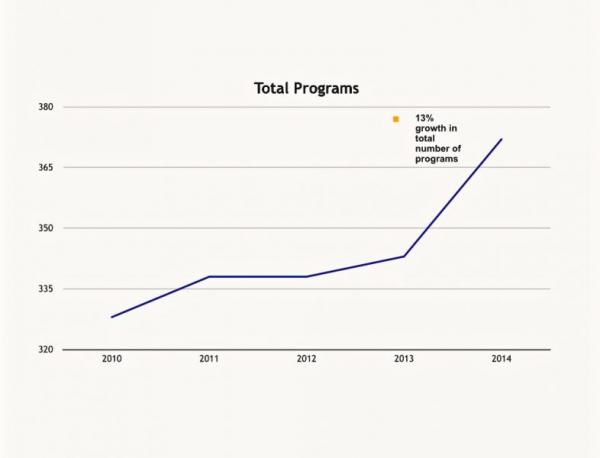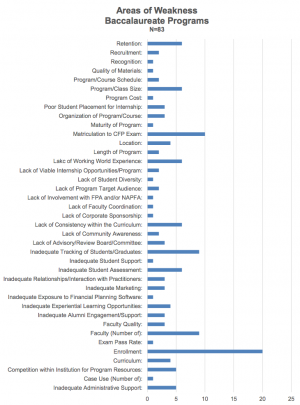The number of CFP Board-registered financial planning programs are on the rise, but schools say student enrollment and completion of the designation are still major challenges.
There’s been a 13 percent increase in the total number of CFP Board-registered programs since 2010, the organization’s head of registered programs Charles Chaffin said Thursday. “There’s been a sharp increase in the past 18 months or so,” he told attendees of the CFP Registered Programs Conference. Moreover, the number of programs offering bachelor’s degrees in financial planning increased by 40 percent in the past four years. Today baccalaureate programs make up 34 percent of the total 372 registered programs, up from 28 percent in 2010.

But despite the growth in the number of programs registered with the CFP Board, the schools offering certificate and bachelor’s degrees in financial planning said the top weaknesses of their programs remain the same: students' enrollment, retention and completion of the CFP exam.
“The heart of our problem is that we need to deal with freshman and sophomores and not juniors and seniors,” Thomas Warschauer, professor emeritus at San Diego State University, said on a panel Friday. Warschauer says the financial planning programs need to develop better ways to reach out to earlier, to let younger students know about this career path sooner.
Almost 70 percent of students with a bachelor’s or master’s in financial planning had not yet taken the CFP exam, according to an August 2013 study conducted by the Board and San Diego State University of over 500 students.
“From a CPF Board perspective, we really believe that students who drop out of the programs and are no longer enrolled, are not only dropping out of institutions, they’re also saying the CFP was not for me. And they tend not to go somewhere else,” Chaffin says.
“It’s safe to say that all of us in higher education are aware and taking steps toward retention. We are looking at retention and looking at ways to help improve it and we’re going to work together to address some of these retention issues going forward,” he added. “We have a vested interest in you being successful,” Chaffin says.
Retention and completion of the CFP exam may also take on an even bigger role for registered financial planning programs. In speaking Thursday, Chaffin noted that during the next renewal phase of the programs' registration with the CFP Board, the data collected from schools on their graduation rates and student exam completion metrics will “play a significant role.”

The CFP Board sent questionnaires to the schools in May asking for self-reported data around the total number of graduates from the financial planning programs, the number of graduates who created an account with the CFP Board, the number of graduates who took the CFP exam, the percentage of graduates who passed the exam and the percentage of graduates who became certified.
The CFP Board is asking schools to create a target goal based on their self-reported data and it’s that target goal that will then play a role in upcoming renewal assessments. “It’s very important that when it comes to things like passing the exam or becoming certified, those are not a direct indicator of program quality, so we’re not holding institutions accountable relative to those two variables,” Chaffin says. “But it is important that students create an ID, it is important that you’re encouraging students to move forward with certification and what your plans are for addressing it.”
Chaffin says the CFP is not looking to assess schools based on universal benchmarks, but rather improvement, realistic targets and schools'plans to address growth going forward. “Almost all of our programs talk about this objective of preparing future CFPs, this is what we’re working on together to try to improve it.”
Currently the CFP Board has 127 baccalaureate programs, 191 certificate programs, 49 master’s programs and five doctoral programs registered by 227 colleges and universities around the U.S., according to Chaffin. Additionally, there are 55 programs in development, 75 percent of which are programs looking to offer undergraduate degrees.


